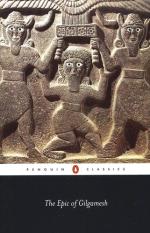|
This section contains 8,611 words (approx. 29 pages at 300 words per page) |

|
SOURCE: Kluger, Rivkah Schärf. “The Puzzling Dreams of Gilgamesh.” In The Archetypal Significance of Gilgamesh: a Modern Ancient Hero, edited by H. Yehezkel Kluger, pp. 53-77. Einsiedeln, Switz.: Daimon Verlag, 1991.
In the following excerpt, Kluger analyzes the dreams described in the Epic of Gilgamesh.
1. on Ancient Terms and Ancient Dreams
I would like to return briefly to the question of the translation of the term hierodule in the context of its religious significance in Babylon. In Thompson's older, poetic translation, he uses the term Hetaira, the Greek term which fits one aspect of the hierodule much better than harlot-lass or barmaid, which sound a little too contemporary. Hetaira fits the spiritual aspect very well, for she was very cultured and so was really a sort of spiritual anima to the man. As you know, in the beginning this was also the case with the geisha in Japan...
|
This section contains 8,611 words (approx. 29 pages at 300 words per page) |

|


